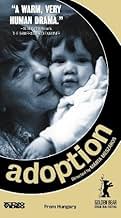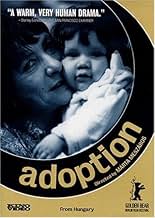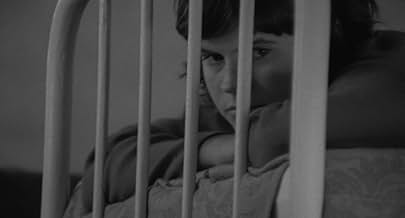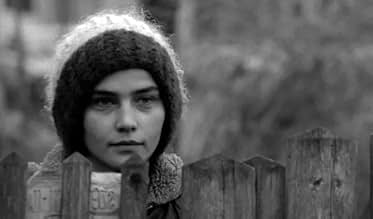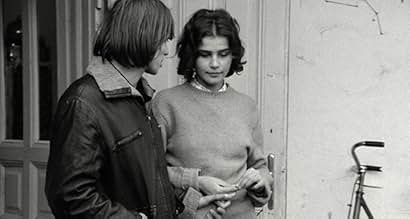IMDb-BEWERTUNG
7,2/10
1595
IHRE BEWERTUNG
Füge eine Handlung in deiner Sprache hinzuA lonely middle-aged woman wants to give birth to a child, but her acquaintance with dysfunctional teenagers leads her to the idea of adoption.A lonely middle-aged woman wants to give birth to a child, but her acquaintance with dysfunctional teenagers leads her to the idea of adoption.A lonely middle-aged woman wants to give birth to a child, but her acquaintance with dysfunctional teenagers leads her to the idea of adoption.
- Regie
- Drehbuch
- Hauptbesetzung
- Auszeichnungen
- 4 Gewinne & 1 Nominierung insgesamt
Katalin Berek
- Csentesné - Kata
- (as Berek Kati)
János Boros
- Anna apja
- (as Boross János)
Árpád Perlaky
- Orvos
- (as Dr. Perlaky Árpád)
Empfohlene Bewertungen
1st watched 7/10/2009 – 4 out of 10 (Dir-Marta Meszaros): Interesting but unsatisfying drama about a middle-aged woman wanting a child but unable to get one in her current situation. She is no longer married and her lover is married to another woman and doesn't want to have one with her. She's medically able and she longs for this. She befriends an orphan from an institution and looks into taking her in as a daughter but this never works out. The movie is about the woman's longing and the routes she has to go to fulfill this. The young girl really just encourages her feelings but the logistics don't make her addition possible. The story is very slow moving and the characters really aren't that appealing. I usually like European movies and their focus on the real drama but this reality isn't that exciting or interesting. It is also very hard to read the main character and she is played very stoicly through most of the movie. Good things happen in the movie, but it's hard to tell the way the movie is directed. Feelings seem to get lost in the ho-hum mix and that's where the movie fails, in my opinion.
Marta Meszaros brings a subtle, yet effective critique of both communist Hungary and the patriarchal system that existed there in the mid 1970s. This film does move slowly, but that is part of what makes it great. It is shot in the social realism style. This means that there are long drawn-out shots, often with little dialogue. Slow camera movements are also a hallmark of this style. Since Adoption was made well outside of the Hollywood system, it does not adhere to the conventions that many American moviegoers would expect. If action-adventure is your kind of movie, skip this one. If, however, you are intrigued by a well told story pertaining to everyday life, this film is worth checking out.
Marta Meszaros was born in 1931 and still making films having made about thirty and shorts and TV also previously married to Miklos Jancso. Mostly known for Diary For My Children (1984) and recently Aurora Borealis: Northern Light (2017) and Adoption made earlier with an award at Berlin. The film is rather sad with the woman in her 40s and really wanting to have a baby but her lover not happy as he already has a wife and children. A young dysfunctional girl, she thinks, it might be an idea, although it is rather silly and it becomes complicated she is already unhappy with her life and her parents. The end is very sudden as she runs for a bus, although it doesn't look like being a good outcome. Nevertheless I thought it was well done and especially of the young girl and the older woman, and of course everyone at the wedding.
One of the great films about women made by a woman, Marta Meszaros' "Adoption" is about the most fundamental need of many women, to be a mother. Kata is a 43 year old widow, living alone but having an affair with a married man who is not prepared to leave his wife. One day she asks him to father a child with her, which she will raise alone, but he refuses. Then she meets Anna, a young girl from the local boarding school, who asks Kata if she can use her house to meet her boyfriend. A friendship develops between them that might lead to all their problems being solved.
Meszaros shoots her film mostly in close-ups as if by focusing on these faces we are also getting inside their heads. It's an unusual treatment of an unusual subject, one that in an American film would have been sentimentalised out of all proportion. As Kata, Katalin Berek is extraordinarily good and the director, one-time wife of Miklos Jansco, never deviates from the intensity of her subject, making this a deeply moving film. Not much seen these days, this remains a key film of the seventies.
Meszaros shoots her film mostly in close-ups as if by focusing on these faces we are also getting inside their heads. It's an unusual treatment of an unusual subject, one that in an American film would have been sentimentalised out of all proportion. As Kata, Katalin Berek is extraordinarily good and the director, one-time wife of Miklos Jansco, never deviates from the intensity of her subject, making this a deeply moving film. Not much seen these days, this remains a key film of the seventies.
Katalin Berek has a checkup She's 42 and wants to see if she can have a child. She wants one, but her lover doesn't. He is a married man, and they understand he's not going to leave his family. Miss Berek is trying to write a letter apologizing for upsetting him when Gyöngyvér Vigh walks into her life. Miss Vigh has her own letter, this one to her mother saying she's been neglected, and she is going off to lead her own life. Then, while she's putting her own life in order, she stays with Miss Berek.
Márta Mészáros's movie about what defines family is neither subtle nor deep, but watching Miss Berek figure it out on her own is rather interesting, and reasonably paced; I never grew impatient with her not getting it sooner. Even the 1970s depression that hangs over this movie and never quite lifts seems appropriate.
Márta Mészáros's movie about what defines family is neither subtle nor deep, but watching Miss Berek figure it out on her own is rather interesting, and reasonably paced; I never grew impatient with her not getting it sooner. Even the 1970s depression that hangs over this movie and never quite lifts seems appropriate.
Wusstest du schon
- WissenswertesIncluded in the Criterion Collection, Spine #1115.
- VerbindungenFeatured in Women Make Film: A New Road Movie Through Cinema (2018)
Top-Auswahl
Melde dich zum Bewerten an und greife auf die Watchlist für personalisierte Empfehlungen zu.
- How long is Adoption?Powered by Alexa
Details
- Laufzeit1 Stunde 29 Minuten
- Farbe
- Sound-Mix
- Seitenverhältnis
- 1.85 : 1
Zu dieser Seite beitragen
Bearbeitung vorschlagen oder fehlenden Inhalt hinzufügen



